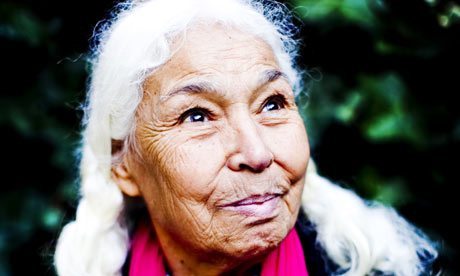Global Roundup: Arab Women to Watch and Pakistan Wins Big on the Global Stage
Weekly global roundup: Who will be 2012's 100 most powerful Arab women? Slut-shaming and victim-blaming persist in India; Liberia is slow to reconcile decades of sexual violence; the UN Commission on the Status of Women is happening now; Female Pakistand director wins country's first Academy Award.

Welcome to our new Weekly Global Reproductive Justice Roundup! Each week, reporter Jessica Mack will summarize reproductive and sexual health and justice news from around the world. We will still report in depth on some of these stories, but we want to make sure you get a sense of the rest and the best.
Arab Women to Watch
In time for International Women’s Day, the second annual world’s 100 most powerful Arab women list will be released by Her Excellency Sheikha Lubna Al Qasimi, The United Arab Emirates’ Minister for Foreign Trade. Al Qasimi topped last year’s list and will unveil the names of nearly 40 brand new entries to the list, which is comprised of Arab women from 18 countries. The list will be released at an event in Dubai on 7 March. Last year’s list included a Jordanian taekwondo champion, former UNFPA executive director and Saudi Thoraya Obaid, and founder of the Arab International Women’s Forum, Palestinian Hafia Al Kaylani. Given this past year’s events in Libya, Egypt, and elsewhere in the Middle East, it will be interesting to see if more democracy and rights activists will grace the 2012 list. Via Arabian Business.
Liberia: Would You Want to Face Your Rapist?
Almost nine years after the end of a decades-long civil war that left 500,000 displaced, women who experienced brutal sexual violence in Liberia’s conflict are still waiting for justice. A Truth and Reconciliation Commission (TRC) was established to provide a space for survivors to speak about what they endured, and name and face their perpetrators. It’s an extreme approach to justice and historical-cultural mending, but has had some success in South Africa. Yet a group of women, who testified several years ago about what happened to them say they haven’t seen any benefits. There has been no follow-up, justice, or counseling. No one has yet been tried for war crimes in Liberia, and the initial recommendations of the TRC, released in 2009, caused an uproar: one was to ban President Ellen Johnson Sirleaf from office for 30 years because of alleged ties to war criminals. Johnson Sirleaf, who won the Nobel Peace Prize in 2011, was recently re-elected and in her inaugural speech emphasized the need for more reconciliation, a fair assessment. Via Guardian.
Commission on the Status of Women Powers On at the United Nations
The 56th Commission on the Status of Women (CSW) is taking place right now at the UN. The CSW is a yearly event that draws representatives of UN Member States to discuss and evaluate the status of gender equity worldwide, and formulate recommendations for advancement. This year the gathering is largely focused on “rural women’s empowerment,” looking at poverty and hunger-reduction strategies as well as land rights issues for women in remote and rural parts of the world. Other sessions have looked at women’s voting access and youth employment. The CSW coincides with a women’s-focused bonanza in New York City, as dozens of side events, meetings, and conferences on a range of global gender issues will take place. CSW ends on March 9, a day after International Women’s Day. You can check out the live webcast of some of the sessions here. Via UN Women.
Victim-Blaming Flourishes in India
Widespread and rampant victim-blaming persists among Indian officials and general public with regards to violence against women. In a country where one woman is president, and another woman all but runs the Parliament, violence against women, and caste-related misogyny in particular, seems hopelessly endemic. A 2006 survey among 500 dalit (low-caste) women in four states found that 70% of them had been raped, sexually harassed or assaulted. Rapes and other instances of sexual violence and harassment are often recorded, but convictions are rare. These too often become instances where a victim is shamed publicly for wearing the wrong thing, staying out too late, or taking the wrong street home. SlutWalks in Delhi and Bangalore last year drew historic attention to this ongoing issue. In addition, parts of India under heavy security force presence (Kashmir, Manipur and Chhattisgarh States) see more conflict-related rape, though “the use of rape to punish women in insurgency-ridden areas is seldom mentioned in more general debates on rape, even though this is one more case of the powerful casting sexual abuse as justified by the victim’s actions or status.” Via International Herald Tribune.
Documentary on Acid Attacks Wins Pakistan’s First Academy Award
“Saving Face,” a documentary about violence against women in Pakistan won the country’s first-ever Oscar this weekend for “best short documentary.” The film was directed by a woman, Sharmeen Obaid-Chinoy, and chronicled the experience of women maimed by acid attacks, often at the hands of their jealous husbands, and the work of one doctor, Dr. Mohammad Jawad, to repair their faces. Pakistan’s Prime Minister has said he will bestow a high civil award upon Chinoy for her work to document this issue. There has been much coverage and excitement in Pakistan after the win, highlighting, as one columnist pointed out, how little ‘good news’ there is in the country, especially when it comes to women’s rights. You can watch the trailer for “Saving Face” here and learn more about acid attacks on women (and the work of Pakistani women’s groups to address this) here. Via The Express Tribune.
